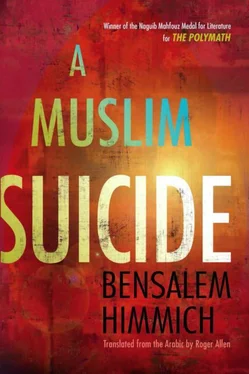I spent the first third of the fasting month of Ramadan secluded in my residence, in the sacred enclosure near the Ka`ba, or in the blessed cave of Hira'. Wherever I happened to be and in whatever state, I only had one aim and one desire: to achieve the state of closeness to the One Necessary Existent, in all His abundance and eternity, that being God alone. In that process I relied on a continuing quest, as I practiced my rituals and climbed upward along the paths of transubstantiation by means of the beautiful names of God, they being the absolute and the ideal. When I had some verbal inspirations that emerged from these gifts of seclusion, I recorded them on imaginary pages, using the same pen that I described earlier. But this time there was a difference, in that I remembered some of them by heart and wrote them down in my room as a text with the title An Epistle on the Illuminations of the Prophet.
A few hours before the celebration of the Night of Power, the governor sent for me. I concealed both the letter and my epistle in my sleeve and went to our rendezvous. He had hardly welcomed me to his residence before he asked me anxiously about the letter.
"Which letter, Sir?" I asked him, pretending not to remember.
"Good grief, Ibn Dara!" he yelled. "I mean the fealty letter."
"Oh, forgive me," I said. "The Devil himself made me forget to give it to you. Here it is, and I also include an epistle about your ancestor, the chosen Prophet. It too is my own composition."
Sitting up, he urged me to come closer. He then started reading both texts out in a muted voice. Once he had finished, he drew me toward him.
"You've done a superb job," he said. "May your pen never go dry! The letter needs no emendations, whether omissions or attachments. In it I express my willingness to offer fealty to the Hafsid ruler known by the name Al-Mustansir as caliph of Islam. As for the epistle, I am prepared to offer my fealty to you as a holy man of God. From now on, please serve as my personal shaykh and religious guide."
When my latest disciple leaned over and embraced me warmly, I was overwhelmed. At that precise moment the chamberlain came in to announce that it was time for the evening prayer. My host stood up at once and asked me to follow him in the company of the Prophet's descendants and his aides. Once we reached the sacred enclosure on foot, we prayed there with the assembled congregation. That was followed by the rituals of the holy Night of Power, the imam's sermon, and recitations of prayers and prophetic eulogies. Every so often, the Zamzami official would raise his voice in prayer for the governor, the people of the Prophet's family, and the community of Muslims as a whole. All these ceremonies were performed in a wonderful atmosphere of holiness, illuminated by lamps and candles, and refreshed by perfumed sprays and purified incense. Throughout it all, I felt that every single cell and bone in my body was turning upward to the heavens in prayers that would be answered in this holy location. My primary wish was that God should look after Fayha', my very life and foundation in a world of troubles and disasters, present and to come.
When the festival arrived, I charged Yasir with distributing my alms and then decided to convey my blessings to the governor himself after the congregational prayer. His palace was full of people, but he spent a few moments alone with me. He told me that a delegation on his behalf was now on its way to Tunis to present the fealty letter to al-Mustansir. I praised the initiative and congratulated the governor for organizing it.
Both of us then joined the larger company. The conversation involved some members of his own retinue and others who had come from Syria, and concerned the continuing clashes between the Mamluk and Mongol forces and the obvious superiority of the former over the latter when it came to military prowess, strategic planning, and experience. Abu Numa was very keen to hear which of the two I expected to be the victor. I suggested that the Mamluks would emerge the winners, with the proviso that the reports of clashes so far were accurate and that there was an exclusion from consideration of unforeseen factors. This was also the opinion of the governor and the assembled group. However, I went on to point out that no throne was wide enough for two victorious leaders to sit on: inevitably one of them would demand obeisance from the other, while the second would have to submit or else suffer the fate of either exile or assassination. As a consequence, there would then only be one leader who could exert his authority as he saw fit.
At this point some voices were raised in favor of Qutuz for the fine achievements of his career; they all devoutly hoped that he would emerge as the sultan. I took the opposite view, expressing my opinion that Baybars was far more likely to be the one to assume power because he had already shown his leadership abilities in the conflicts with the Crusaders in Egypt. He had defeated them at AlMansura, imprisoned their king, and only let him go after a large ransom had been paid. His sword was far more effective when it came to killing his enemies and indeed his rivals. The elite and the populace in Egypt both referred to him as "the Conqueror." All this was quite apart from his renowned talent and influence in matters of leadership and the military.
As the group broke up, the governor leaned over to me. "Holy man of God," he told me as he bade me farewell, "if your assumption is correct, I'll have to pay you whatever you ask. If, on the other hand, you're wrong, you'll owe me!"
"That's not a legitimate bet!" I whispered jokingly.
On my way to the sacred enclosure I pondered the fact that his firmly fixed opinion may have been the same as my own, and yet he was tagging me along so as to be able to cajole me into doing what he really wanted through actual help or in some other kind of service.
Back at the residence I shared lunch with Yasir, Ghaylan, and some other residents. We discussed whatever interested them; sometimes the topic was secular, at other times religious. Before I went to my quarters, the warden handed me a sealed letter from Sitt Umama. In it she offered me her blessings on the festival day and went on to inform me that she was moving to Medina so as to allow my thoughts to reside exclusively with my beloved wife and to remove all possibility of suspicion or malicious gossip. She concluded her message with expressions of fulsome prayer for myself and my wife and appended her new address, duly sealed with expressions of love and respect. I will not conceal the fact that, when I finished reading what she had written, my heart shrank a bit and gave a little shiver.
At the beginning of the month Dhu al-Qa`da, Ibn Bartala, the leader of the governor's delegation to Tunis, came back and provided me with an enthusiastic description of the way the caliph had welcomed the fealty of the people of the holy family and their mighty leader. He went on to describe the sermons in mosques that had accompanied their reception and the celebrations that had been attended by both the elite and the general populace. Ibn Bartala finished by noting that it had been a totally remarkable day. He then proceeded to recite to me several paragraphs from the letter the Hafsid had sent, praising the Prophet's family and lauding their governor, Abu Numa.
At the end of this same month, news arrived of the victory that Qutuz and Baybars had scored at the Battle of 'Ayn Jalut. The Mongol commander, Altunbagha, had been imprisoned and killed, and the Mongol army had retreated from Syria and Iraq as well. Mecca, the cities of Arabia, and others as well were all overwhelmed by feelings of joy and relief. Everyone could now take a deep breath, as they praised God and offered Him thanks for enabling them to emerge victorious after so much hardship. At the hands of His servants, the Mamluks, the Mongols had finally been driven back. The Zamzami official, preachers, and pilgrims to Mecca in general all offered fervent prayers of thanks to the Mamluks and their redoubtable commanders.
Читать дальше












